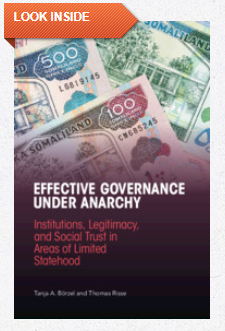Effective Governance Under Anarchy: Institutions, Legitimacy, and Social Trust in Areas of Limited Statehood
Clay G. Wescott | 06 July 2021
Book Review
Effective Governance Under Anarchy: Institutions, Legitimacy, and Social Trust in Areas of Limited Statehood
by Tanja A Beorzel and Thomas Risse
Cambridge, U.K.: Cambridge University Press. 2021
The authors, Georzel and Risse from Freie Universititat Berlin, analyze fragile countries and areas of limited statehood (ALS) within fragile and other countries. Depending on the effectiveness of their governing institutions, these ALS can have highly variable results in policy areas such as security, human rights, and public health, which in turn affects government legitimacy and social trust within the ALS itself. The province of Somaliland, for example, is relatively successful compared to other areas within the same country, Somalia. Governed by councils of elders, the province is relatively peaceful, protects human rights, has some degree of rule of law, and, with support of the Global Fund to fight malaria, tuberculosis, and HIV/AIDS, a functioning public health system.
Many policy-relevant findings are derived. First, comprehensive state-building efforts in fragile states often fail, while more focused efforts to improve security, justice and essential services can succeed with institutions fit for purpose and context. The Solomon Islands, for example, delegated its police, military, and judiciary to Australia and New Zealand for about 14 years. One observer found that at the end ‘only a few could recall precisely what the mission was initially intended to accomplish, or assess how it might be judged’; still, there were many positive results. On the other hand, more comprehensive state-building in larger, more distant, more complicated places such as the ongoing efforts by the USA and allies in Iraq and Afghanistan have largely failed to achieve hoped-for results within an acceptable time period. One exception could be the EU's efforts in Bosnia and Kosovo, where they have not put a time limit on their commitment and have a powerful incentive to offer: possible EU membership.
Second, warlords and rebel leaders can sometimes play a useful role in governing ALS if they live in the area: analogous to Mancur Olson's "stationary bandits". Likewise, ISAF was viewed favorably by Afghans in the initial years. However, the role of armed governors in ALS in effective governance doesn't last for long; sustainable solutions require soft power that is trusted and viewed as legitimate. In the Afghan case, aid workers and NGOs are still highly regarded, while ISAF, warlords and other armed forces are not. In the authors' terminology, the former had "output legitimacy" that for a while overrode the lack of 'input legitimacy', but not for long; the soft power providers have both input and output legitimacy: ie they are trusted, and they deliver the goods.
Third, don't expect governance like in Denmark to emerge in a place like the DRC. But we do find that courts in Eastern Congo prosecute rape cases more thoroughly than courts in South Africa, and are light years ahead of courts in other parts of DRC. The Eastern Congo courts apply the Rome statute of the ICC as if it was national law. Domestic and international NGOs train prosecutors and judges that work in local courts. By contrast, in South Africa, the NGOs defer to the central state institutions, which arguably inhibit rather than promote rule of law in this sensitive area.
There's lots more; best to read the book. Some topics could be more developed. For example, the analysis of Afghanistan mainly leaves out the spoiler role of Pakistan in supporting the Taliban. This is a key roadblock to effective governance. Another point that could be developed is that many of the successes in moving out of ALS have taken place without a key role for aid donors. Bangladesh, for example, emerged from its nadir in the early 70s on the way to becoming an emerging market country through business development as a garment producer, combined with support from world-class local NGOs in supporting quality public services. Vietnam emerged from its post-war economic misery starting in the 1980s with the local "Đổi Mới" (renovation) approach from central planning to markets. When the ideas for this were just being formed in the late 1970s, and the World Bank's Vice President East Asia said he thought that the Bank should support Vietnam in its effort, he was fired.
Clay G. Wescott, President, International Public Management Network and he is also the member of international Advisory Board at Centre for Governance Studies (CGS).
This book review was originally published at https://www.goodreads.com
